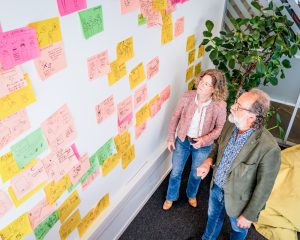
Advancing energy flexibility in buildings
Transforming building energy management with smart control systems
The BuildInFlexergy project, funded by the Dutch Mission-Driven Research, Development, and Innovation (MOOI) program, is revolutionizing building energy flexibility. This is supported by the Dutch Ministry of Economic Affairs and Climate Policy and the Ministry of the Interior and Kingdom Relations, and managed by the Netherlands Enterprise Agency (RVO). This four-year industry leading initiative unites 10 industry partners (including Eindhoven Engine) and 2 top universities (TU Eindhoven and TU Delft).
A unified approach to innovation
Coordinated and managed by Kropman B.V., the consortium includes installation companies, energy consultants, platform developers, building owners and managers, technology providers, and other experts. The aim is to foster open knowledge exchange and drive innovation through strategic collaboration and widespread dissemination of results.
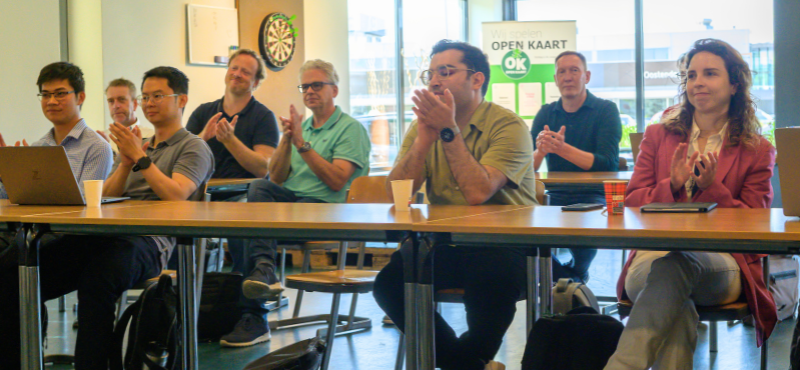
Buildings at the heart of the energy transition
As the energy sector shifts towards a decentralized, digital, and low-carbon future, buildings—significant consumers of electricity and thermal energy—are key to providing demand-side flexibility. This flexibility allows buildings to adjust their energy use in response to external signals like electricity prices, carbon intensity, or grid constraints, without sacrificing occupant comfort or essential functions.
Kick-off meeting 17th June, 2025 | Kropman Nijmegen
The power of model predictive control
Model Predictive Control (MPC) is a cutting-edge tool for optimizing building energy performance. Unlike traditional control systems, MPC uses predictive models and real-time data to proactively manage a wide range of systems, including HVAC (Heating, Ventilation, and Air Conditioning), lighting, heat pumps, thermal storage, electric vehicles charging and other building loads It uses forecasts of occupancy, weather conditions and other relevant parameters to determine the best control actions over a future period, continuously updating the plan based on new data.
The aim of this project is to foster open knowledge exchange and drive innovation through strategic collaboration and widespread dissemination of results.
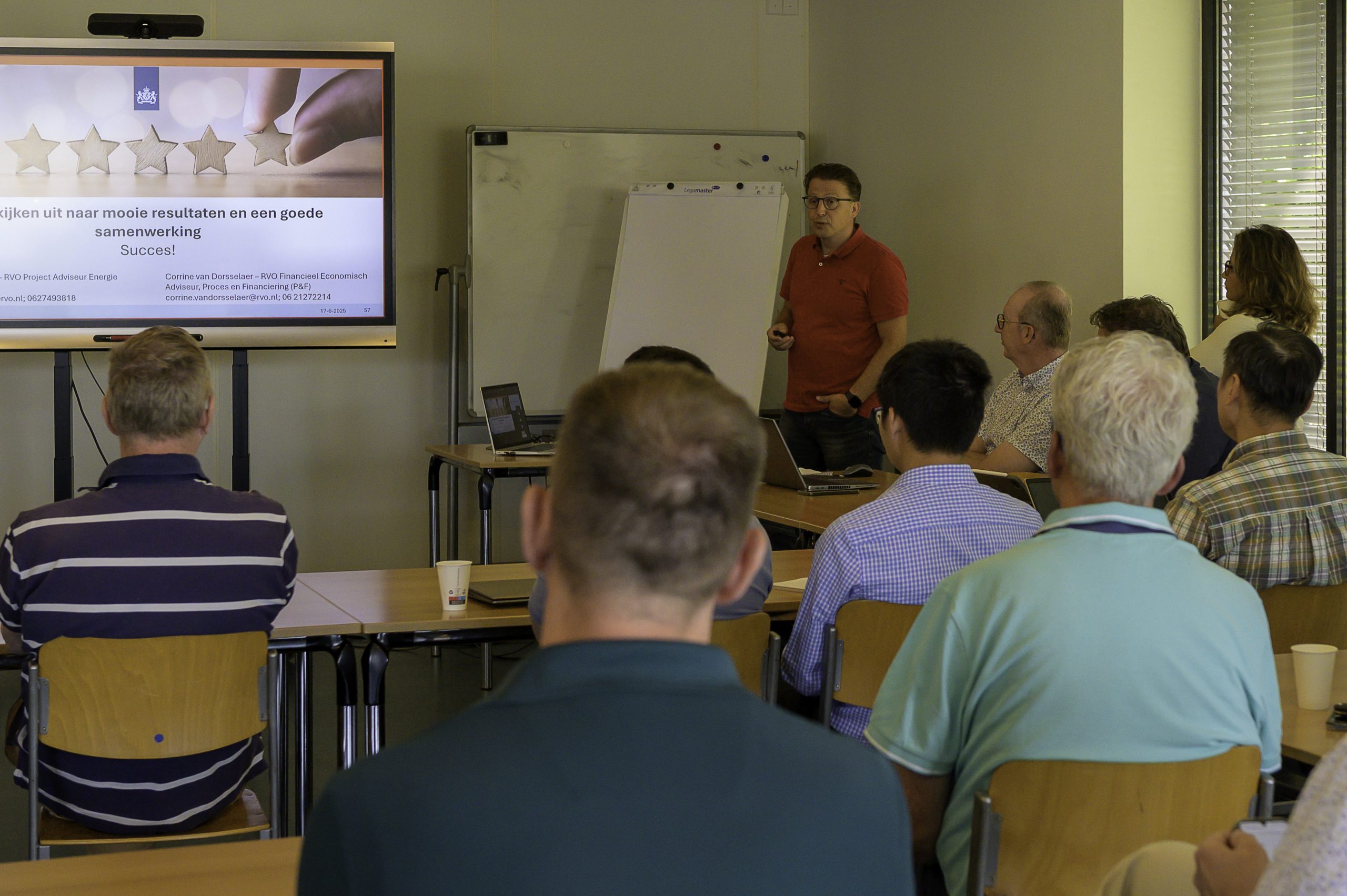
Real-time responsiveness with dynamic climate control
Dynamic climate control adjusts HVAC settings and ventilation rates based on changing indoor and outdoor conditions. This allows buildings to pre-cool or pre-heat spaces when renewable energy is plentiful or electricity prices are low, shifting loads without compromising comfort or overloading the grid.
Optimizing with key performance indicators
Key Performance Indicators (KPIs) are developed based on the Smart Readiness Indicator. KPIs guide decisions and balance objectives like energy cost, comfort, CO₂ emissions, and grid support. KPIs such as total energy consumption, peak load reduction, indoor comfort indices, and flexibility scores can be prioritized based on goals.
The future of building energy flexibility
The KPI-driven MPC framework makes buildings energy-efficient, grid-responsive, and climate-conscious. This approach is ideal for buildings in smart grids or demand response programs, supporting both building managers’ operational goals and energy system planners’ strategic targets.
In conclusion, combining MPC, dynamic climate control, and KPI-driven optimization can significantly enhance building energy flexibility. This strategy is crucial for making buildings active participants in the low-carbon energy system of the future.
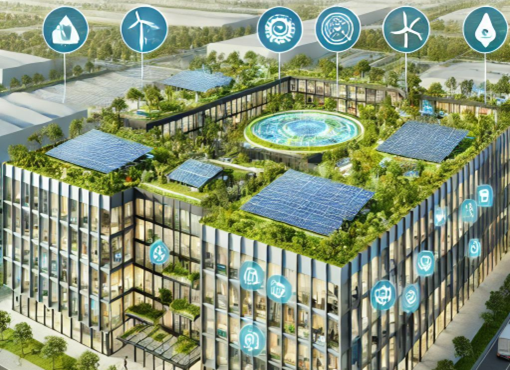
Tackling energy challenges in buildings
The BuildInFlexergy approach
As buildings become increasingly reliant on electricity to maintain their indoor climate, they face challenges such as electricity supply and limited grid capacity.
To address these issues, Eindhoven Engine is happy to announce the BuildInFlexergy initiative commenced on May 1st, 2025.
Focus on energy flexibility
This project brings together 12 partners, including Eindhoven Engine, with the goal of enhancing the reliability and efficiency of local energy supply by better utilizing energy flexibility. This initiative is particularly crucial for large, complex building systems equipped with heat pumps and thermal energy storage. These systems often experience stability and coordination issues, which can negatively impact both energy and comfort performance. By focusing on energy flexibility, BuildInFlexergy aims to overcome these challenges and ensure a more stable and efficient energy supply for building.
Smart control systems and model predictive control
Transforming building energy management with smart control systems and model predictive control, we achieve real-time responsiveness and dynamic climate control, optimizing with key performance indicators. This unified approach to innovation places buildings at the heart of the energy transition, paving the way for the future of building energy flexibility.
This project not only addresses current challenges but also sets a precedent for future developments in energy-efficient building management.

Mijke the Matchbot: Bridging gaps with AI
Hi, I’m Sichen, and I am currently pursuing an Engineering Doctorate (EngD) at Eindhoven Engine. With a background in Industrial Design and a strong focus on user experience (UX) and interaction design, I completed my master’s at Eindhoven University of Technology.
I now work within the focus area Inclusive Society, exploring how AI can bridge the gap between individuals with low literacy and the support systems around them. Our solution? Mijke, the Matchbot.
Breaking barriers with AI
My EngD project focuses on the development of Mijke from the Met Mij project, a conversational AI chatbot designed to support NT1 (Dutch as a first language) adults with limited basic skills in accessing local services. Hosted on WhatsApp and powered by a large language model, Mijke offers both voice and text interaction—reducing the barriers many users face with written communication.
The project explores five core challenges:
1. Clarity in communication
Ensuring the chatbot communicates clearly.
2. Emotional connection
Providing a supportive and empathetic interaction.
3. User-friendly design
Making the chatbot intuitive and user-friendly.
4. Multi-modal accessibility
Offering multiple modes of interaction.
5. Precision in support
Connecting users with the right help efficiently.
For more information about Mijke and the Met Mij project.
Addressing information inequality
Millions of people in the Netherlands struggle with basic literacy, numeracy, and digital skills. Mijke shows a possibility of solving this information inequality by offering a friendly experience tailored to the real-world needs of often overlooked people via Artificial Intelligence (AI). This work stands at the crossroads of technology, social equity, and public service innovation, showing how AI can be used responsibly in human-centered design.
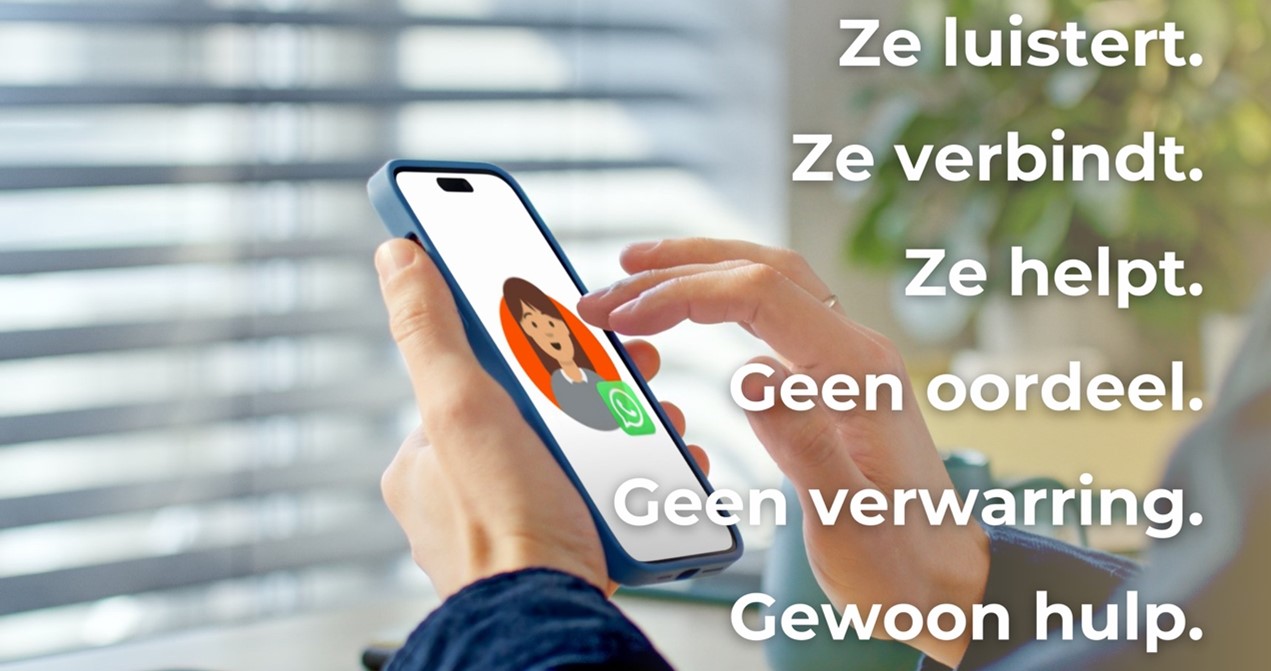
Empowering communities
I aim to help people with limited basic skills access support more easily and confidently. By doing so, I hope to decrease the workload of stakeholders, such as social workers, employees from municipalities, or public service staff. Additionally, I want to set a benchmark for evaluating AI recommendations in social public service contexts and contribute new knowledge and tools to the fields of human-computer interaction (HCI), accessibility, and digital inclusion.
This work stands at the crossroads of technology, social equity, and public service innovation, showing how AI can be used responsibly in human-centered design.
Eindhoven Engine News – March 2025
In this edition of Eindhoven Engine News: Innovation accelerator Eindhoven Engine enters new phase, Transforming basic skills support with AI and more!
What else is happening at Eindhoven Engine?
New video: DynaPopeX
In the DynaPopeX project, TNO and Zicht op Data focus on reducing poor air quality. By combining data, location, and human movement patterns in Eindhoven, they develop tangible measures to minimize people’s exposure to harmful particulate matter and limit potential health risks. This is crucial for the municipality of Eindhoven to understand the most significant impacts of air quality and improve the health of its residents.
Building a Healthier Future
My Journey at Eindhoven Engine
Hello, my name is Golnoosh Sabahifard, and I am currently pursuing my EngD traineeship at Eindhoven Engine. My focus is on the Livable Region program, where I am committed to enhancing the public well-being of residents.
At Eindhoven Engine, our mission is to create a sustainable and livable Brainport region where everyone can live healthily and safely. Our goals include reducing health disparities in neighbourhoods by 20% and adding three healthy living years for every person.
Understanding public well-being
Public well-being is influenced by eight factors: loneliness, stress, fewer years of good perceived health, lack of green spaces, noise pollution, population density, and distance to basic facilities. My research focuses on evaluating the effectiveness of current assessment tools and developing a dynamic model that visually illustrates how these factors interact to affect urban health.
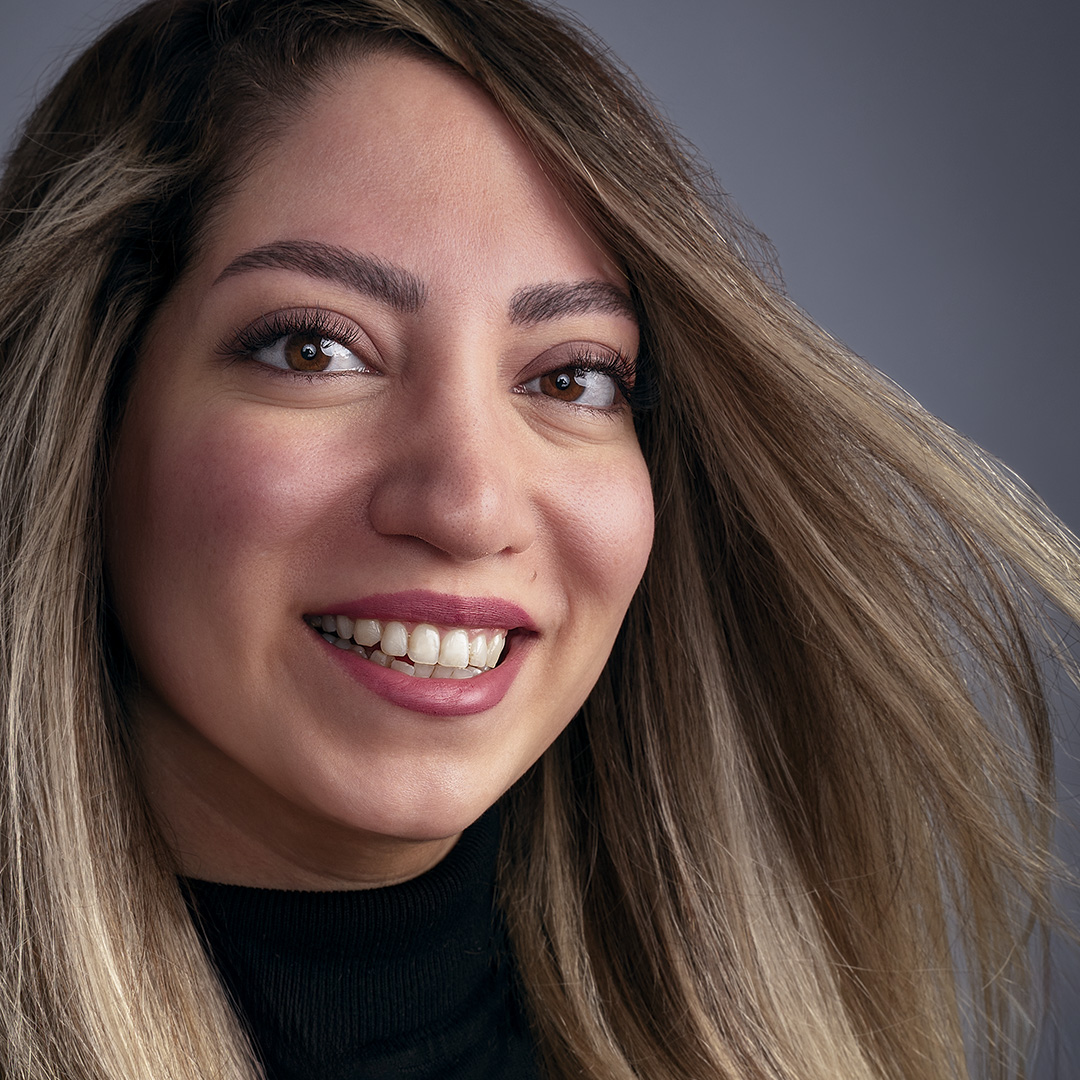
The importance of interactive and dynamic analysis
The built environment significantly impacts public well-being, influencing both mental and physical health. Traditional urban assessment tools often lack interactive and dynamic analysis, making it difficult to estimate the long-term impacts of various elements.
My traineeship aims to change this. I am using Vensim, a visual modeling tool, to provide a data-driven, visual method that helps stakeholders understand how small changes in urban planning can lead to significant health benefits. This approach is crucial for evidence-based urban planning, enabling policymakers to make informed decisions to create healthier, more sustainable cities.
Ultimately, this work will lay the foundation for future research on building healthy and sustainable urban environments.
Media: Technologie in de volwasseneneducatie (2)
Inclusive technology in educational pathways for adults
In an interview (in Dutch) with Lotte Geertsen (Program manager Inclusive Society) and Walter Baets (Wicked Problems officer), about technology in adult education, they explain that a different way of thinking is needed to innovate. Met Mij from Eindhoven Engine, is designed for people with lack of basic skills, is a perfect example.
𝑇ℎ𝑖𝑠 𝑖𝑠 𝑝𝑎𝑟𝑡 𝑡𝑤𝑜 𝑜𝑓 𝑎 𝑡𝑤𝑜-𝑝𝑎𝑟𝑡 𝑖𝑛𝑡𝑒𝑟𝑣𝑖𝑒𝑤. 𝑅𝑒𝑎𝑑 𝑝𝑎𝑟𝑡 𝑜𝑛𝑒 ℎ𝑒𝑟𝑒.
[Article is in Dutch]
Eindhoven Engine News – December 2024
In this edition of Eindhoven Engine News: Innovation accelerator Eindhoven Engine enters new phase, Transforming basic skills support with AI and more!
What else is happening at Eindhoven Engine?
Transforming basic skills support with ai
For over two years, the Inclusive Society focus area at Eindhoven Engine has been tackling the complex issue of lack of basic skills. Driven by the belief that everyone deserves to participate fully in society, we have deeply explored this challenge to find ways to bridge the gap between individuals with low literacy skills and the broader community.
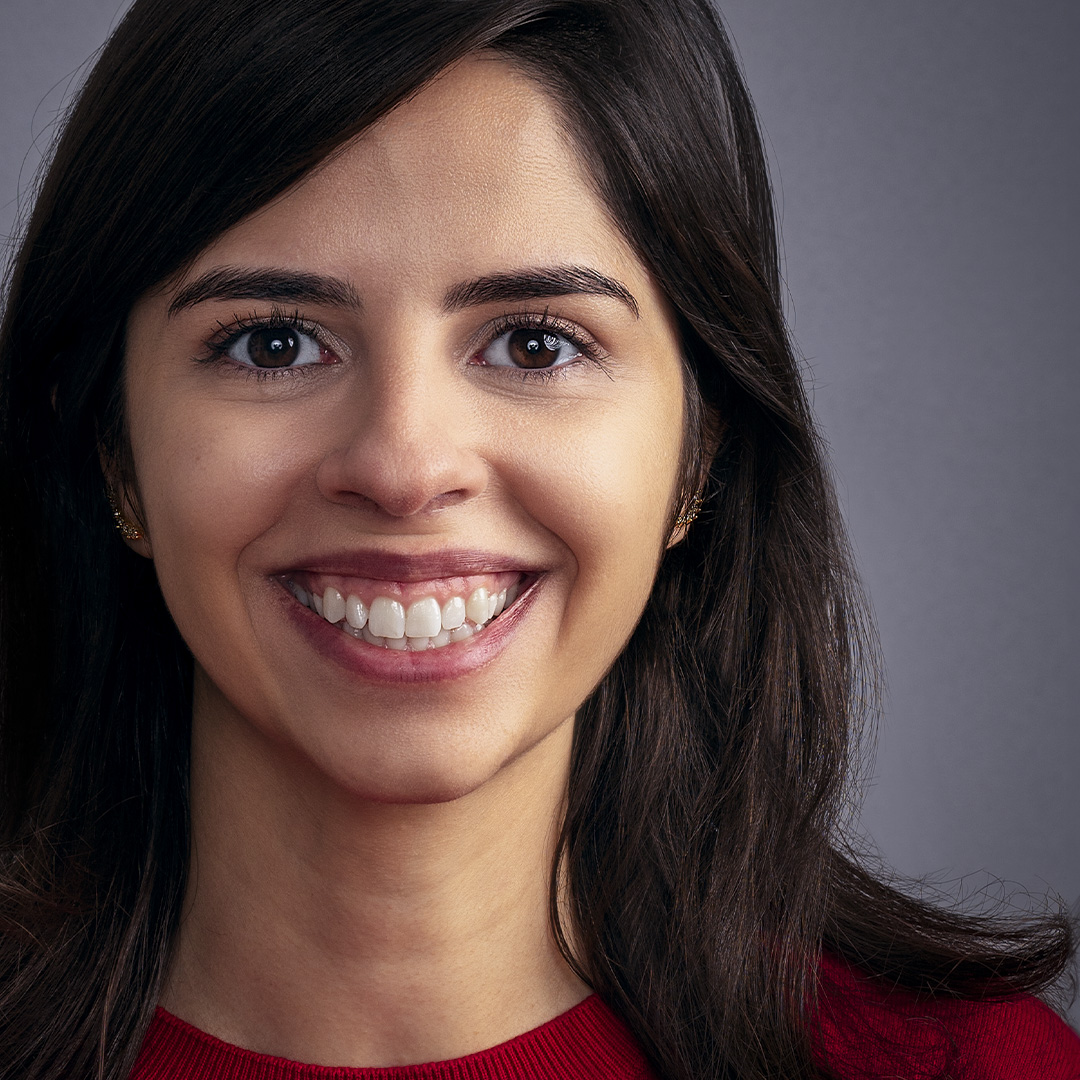
Jéssica Goss, EngD Doctorate in Designing Human-Systems Interaction, joined Eindhoven Engine two years ago to research effective methods to support this group. Her work has been instrumental in shaping our approach.
Met Mij
Met Mij aims to connect individuals with basic literacy needs to the social services available in the Eindhoven region. Despite the presence of over 200 organizations, 8 out of 10 people initially find themselves in the wrong place, leading to feelings of shame and insecurity. By addressing this mismatch and the stigma faced by individuals aged 16 to 40—the hardest group to reach—we are creating an ecosystem where help is both accessible and effective. Our goal is to understand each person’s unique needs, connect them with the right local support, and build their confidence and independence by ensuring they receive the correct assistance on the first try.
A human-centric design approach & AI
We use a human-centric design approach combined with advanced AI technology to provide personalized and stigma-free assistance. Through “Mijke,” our WhatsApp matchbot, users can access services by simply typing or speaking a message. This method ensures ease of use and meets the target group where they are—online. By collaborating with local organizations, we continuously refine Mijke based on real-world feedback, creating a seamless connection between technology and human needs.
Working together with CSU
Most recently, Met Mij participated in CSU’s Innovation Award 2024 and advanced to the semi-finals. Although it did not win, CSU, a professional cleaning company in The Netherlands, recognized the potential of the solution and initiated further collaboration with Eindhoven Engine to test and refine Mijke with their employees. The ongoing tests made by the team have received positive feedback, offering essential insights to improve the tool and ensure it creates a meaningful impact for those it aims to support.
Building a more inclusive Eindhoven
Join us in making Met Mij a reality!
Whether you want to test the tool, contribute your technological expertise, or support us with funding, your involvement is invaluable. Together, we can create a future where everyone has access to the support they need, exactly when they need it. Let’s build a more inclusive Eindhoven and expand this vision to other cities and countries.
Inclusive society
In the Netherlands, 2.5 million people struggle with reading, writing, arithmetic and/or digital skills. These people are confronted with immense challenges on a daily basis, which seriously hinders their participation in society. Eindhoven Engine emphasizes the urgency of this problem and the need for action.
Media: Technologie in de volwasseneneducatie (1)
Inclusive technology in educational pathways for adults
At Eindhoven Engine, we are dedicated to leveraging AI technology to support individuals who struggle with reading and writing, helping them better integrate into society and mitigate the challenges they face.
Our Inclusive Society team has developed the Mijke Tool, an innovative solution integrated into WhatsApp. This tool provides easy access to the right services and assistance for those in need. In a recent article, Ina den Hollander and Ben Vaske from oefenen.nl showcased various applications, including Mijke, demonstrating how AI can foster greater inclusivity. Together, we are making strides towards a more inclusive society where everyone has the opportunity to thrive.
𝑇ℎ𝑖𝑠 𝑖𝑠 𝑝𝑎𝑟𝑡 𝑡𝑤𝑜 𝑜𝑓 𝑎 𝑡𝑤𝑜-𝑝𝑎𝑟𝑡 𝑖𝑛𝑡𝑒𝑟𝑣𝑖𝑒𝑤. 𝑅𝑒𝑎𝑑 𝑝𝑎𝑟𝑡 two ℎ𝑒𝑟𝑒.
[article is in Dutch]
